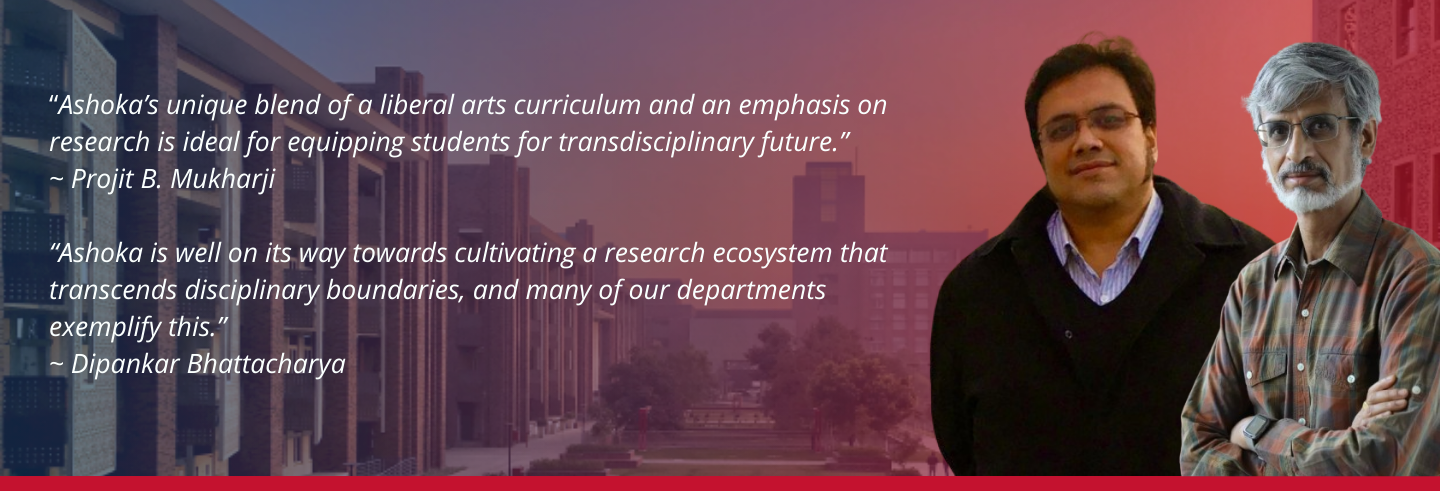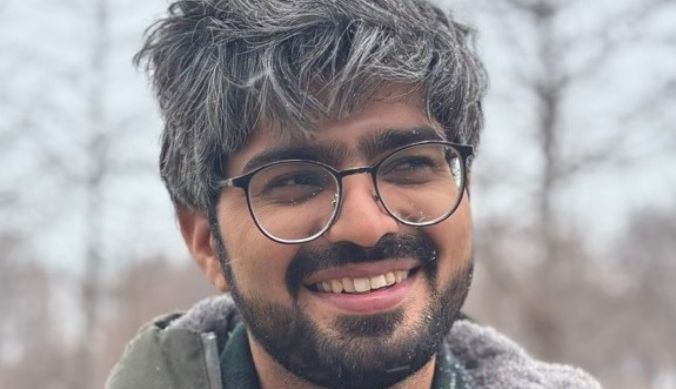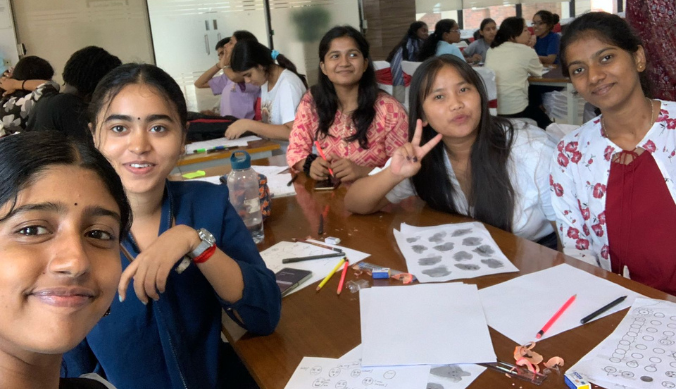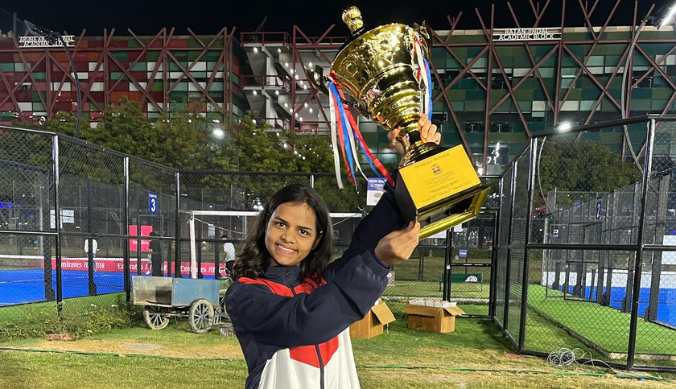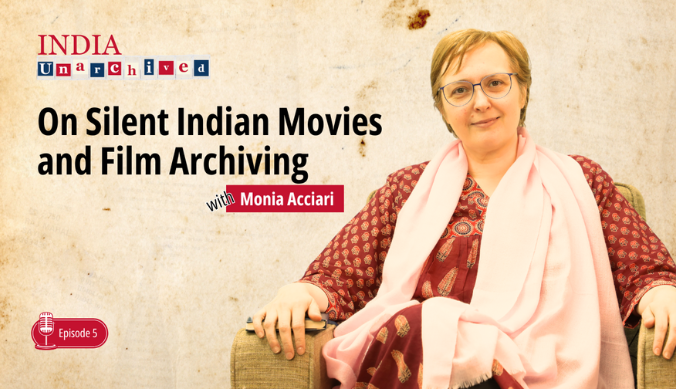Charting the Path Towards Becoming a Research University
This interview blog explores how Ashoka University is strengthening its research capabilities and promoting interdisciplinary growth as it pivots towards the Sciences. It features insights from Dipankar Bhattacharya and Projit B. Mukharji, Heads of the Departments of Physics and History, respectively, on their visions for collaboration, innovation, and the future of education.
With Ashoka stepping into its second decade, the last few years have seen a significant push towards increasing research capabilities across disciplines, and an effort to expand the Sciences at Ashoka. We caught up with Dipankar Bhattacharya (Sunanda and Santimay Basu Chair for Astrophysics and Head of Department, Physics) and Projit Mukharji (Head of Department and Professor of History) to discuss how their respective departments are poised for growth and collaboration in the arena of research.
Q: Both of you have joined Ashoka at a crucial juncture, with the University pivoting to both the Sciences and research. How do you see your department evolving to address both these threads?
Projit: The History Department at Ashoka is widely recognized as one of the foremost in the country. Research has been a part of our profile even before the university-wide pivot. The new direction the University has embarked on will allow us to further amplify our existing emphasis on research. The introduction and expansion of the Sciences is also enabling us to build on existing strengths. My colleagues, Nayanjot Lahiri and Kalyan Sekhar Chakraborty, for instance, have developed a close working relationship with the Department of Biology through their work at the Centre for Interdisciplinary Studies. Similarly, strong ties have been forged with environmental scientists. My own work in the History of Science resonates with multiple Science departments.
Dipankar: I agree with what Projit is saying. Just like the History Department, the Physics faculty has a strong research focus, with a steady output. At present, two members of the Physics faculty are experimentalists, and they are in the process of developing their laboratory facilities at Ashoka. These labs already engage several PhD scholars and senior undergraduates in ongoing research programs. This activity is definitely poised for significant growth. Going forward, we expect to double the number of faculty members and look forward to a postdoctoral program that can serve as a major boost to our research output. We are also aiming to expand from our current research focus towards areas like quantum science, complex systems, and emergent phenomena.
Q: Ashoka is also one of the first universities to offer Astronomy as a discipline to undergraduate students. Dipankar, could you elaborate on how the department hopes to build and grow the Astrophysics program?
Dipankar: The Astronomy Minor was launched in January 2023, offering a unique curriculum that covers much of modern Astronomy at an undergraduate level. The next step would be to introduce an Interdisciplinary Major in Physics and Astronomy in due course. We are also exploring the development of new course offerings in collaboration with the humanities departments. As our laboratory facilities expand, more hands-on components will be introduced. Over time, we plan to add research activities in emerging areas like exoplanets, observational cosmology with large surveys, and multi-messenger astronomy. In the next few years, researchers in India are poised to gain access to large international astronomical facilities, and it will be our goal to train and involve Ashoka students in using these facilities for state-of-the-art astronomical research.
Q: What are some areas of growth that the Department of History will focus on in the coming years?
Projit: In the longer term, I would love to see us teaching more non-Indian histories, particularly African history and the histories of other parts of Asia. Having worked for two decades in Europe and North America, I have seen how world-class universities like Oxford and Harvard teach histories from various parts of the world. In India, the tendency is to focus almost exclusively on Indian history. However, if we want to attract students from other parts of the world, or produce students who can function in an increasingly globalized world, we must educate them on the deeper – and often shared – histories of India with our Asian and African neighbors.
Q: In your opinion, what makes interdisciplinary research important in today’s context? How is Ashoka equipped to handle this type of work?
Dipankar: Ashoka is well on its way towards cultivating a research ecosystem that transcends disciplinary boundaries, and many of our departments exemplify this. Physics, in particular, offers numerous opportunities to develop collaborative and cross-disciplinary research with other departments. The department already has a significant overlap with Biology through the study of biomaterials and epidemiology. Other developing collaborations include those with the Centre for Climate Change and Sustainability, as well as the Departments of Chemistry and Computer Science.
Projit: None of the contemporary global issues that we face today – climate change, global pandemics, increasing war, and violence – can be tackled by any single discipline. By the time today’s students become scientists, policymakers, economists, or business leaders, this trend will be even more pronounced. Given the ever-growing complexity of our socio-technical infrastructures, future challenges will require us to think across disciplines. Ashoka’s unique blend of a liberal arts curriculum and an emphasis on research is ideal for equipping students for this transdisciplinary future. The bane of Indian higher education is over-specialization from an early stage. On the other hand, some efforts to remedy this have led to clubbing many distinct disciplines into a single department. Ashoka’s model avoids these pitfalls.
Interviewee: Dipankar Bhattacharya, Head and Faculty of the Department of Physics and Projit B. Mukharji, Head and Faculty of the Department of History
Interviewer: Yukti Arora (Academic Communications, RDO) and Sreya Roy Chowdhury (Strategic Communication, Development Team)
Study at Ashoka







